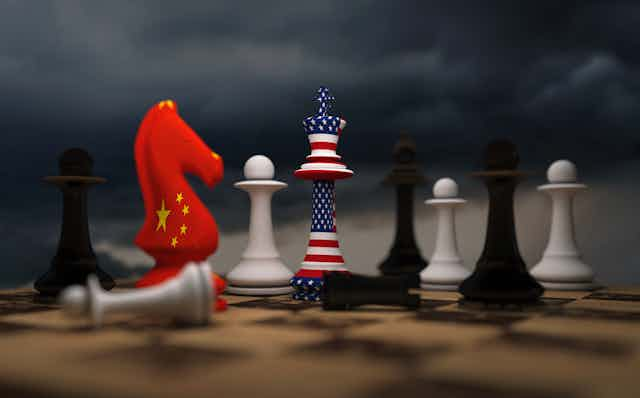As the general election nears, the campaign focus so far has been almost exclusively on domestic issues. And yet, over the past two months, no fewer than five government documents have been released outlining the significant defence and security challenges the country now faces.
If there is one theme that unites these reports, it is captured in the Defence Policy and Strategy Statement’s observation that “New Zealand is facing a more challenging strategic environment than it has in decades”.
That assessment matches other national security reports, defence reviews and Indo-Pacific strategies released in the past 12 months by Australia, Germany, Japan, Britain and South Korea.
All support the essential pillars of the post-1945 international system – including the US alliances in Europe and the Indo-Pacific, the United Nations system, and the basic international capitalist economic framework – that have underpinned stability and prosperity.
That stability is now under sustained challenge from a combination of forces: US-China rivalry, Russian expansionism, nationalism, ethnic conflict, populist domestic politics, as well as climate change and possible future pandemics.
The situation is complicated by the deep economic relationships shared by those powers challenging aspects of the existing international order and those seeking to defend it: Russia is Germany’s key energy supplier and its fourth-largest non-European Union trade partner; China is the top trade partner of Australia, Japan, New Zealand and South Korea (and Germany’s second-largest).
No new Cold War
As this complex picture has evolved, there has been careless talk of a “new Cold War” – but it’s a flawed comparison.
Unlike the Soviet Union, which dominated Eastern Europe after the second world war, Russia cannot even secure victory against a state on its periphery. Moscow’s Ukraine war is a strategic defeat that confirms its decline as a major power – not least by reinvigorating NATO.
Read more: NZ’s first national security strategy signals a 'turning point' and the end of old certainties
At the same time, the US relationship with China is fundamentally different from its Cold War relationship with the Soviet Union. Six years after the then US president, Donald Trump, declared a “trade war” with China, interdependence has actually increased.
The US and China are now each other’s top trading partner. In contrast, the Soviet Union and the US had significantly lower levels of trade.
During the Cold War, the Soviet Union and the US had formidable global alliance systems. In 2023, the US has expanded its alliances into Eastern Europe and the Indo-Pacific, while China has only one formal ally, North Korea.
The rise of ‘strategic competition’
That said, the stakes of current US-China “strategic competition” are difficult to overstate. It will shape the character and rules of the international system for the 21st century and beyond.
China is a formidable competitor seeking to balance US power, not least in the Indo-Pacific, the powerhouse of the world economy. As the 2022 US National Security Strategy states:
[…] the post-Cold War era is definitely over and a competition is underway between the major powers to shape what comes next [… The US] will partner with any nation that shares our basic belief that the rules-based order must remain the foundation for global peace and prosperity.
Essentially, the US view is that alliances and partnerships will determine the course of world politics, even more than during the Cold War.
Membership of this sphere will yield privileges, while non-membership risks economic and military costs (something New Zealand will need to consider in its decision on joining pillar two of the AUKUS security pact).
Read more: The defence dilemma facing NZ's next government: stay independent or join 'pillar 2' of AUKUS?
Washington needs allies
There are two important implications for New Zealand and its key partners (including Australia, most of the ASEAN nations, the EU, UK, Japan and South Korea).
The first involves the objective decline in US power since the 2008 global financial crisis and the rise of its allies and partners.
The stability and fortunes of the international order that Washington has constructed will increasingly hinge on the willingness of those allies and partners to defend key principles that underpin the system.
These include the defence of state sovereignty through cooperative relationships with international institutions, and the free flow of trade and investment.
It is notable, too, that New Zealand’s recent defence and security statements – like those from Australia, Britain, South Korea and Japan – use the US concept of “strategic competition” to characterise the central dynamic of this new era.
China’s national security planners will not have failed to notice this.

Speaking truth to power
The second implication involves the role America’s allies and partners expect it to play in the world. These countries are critical in sustaining the existing economic and political order, and expect US restraint in its defence of it.
An enlightened understanding of America’s own national interest is consistent with those expectations. For example, most reasonable observers in the US would now agree with the Helen Clark government’s position of “speaking truth to power” in not backing the invasion of Iraq in 2003.
Read more: The 'number 8 wire' days for NZ's defence force are over – new priorities will demand bigger budgets
And there is strength in numbers. The sooner the US internalises the view that constructive feedback from allies and partners is an asset in the age of strategic competition, the more likely it is that the current international order can last.
The next New Zealand government faces the most challenging set of circumstances and decisions since the breakdown of the ANZUS alliance in the mid-1980s. It will have to define more clearly how the country’s independent foreign policy is reinforced by closer cooperation with allies and partners.
And it will no longer be able to use that idea of independence as a reason to avoid long overdue but necessary decisions on the funding of foreign policy and defence.

